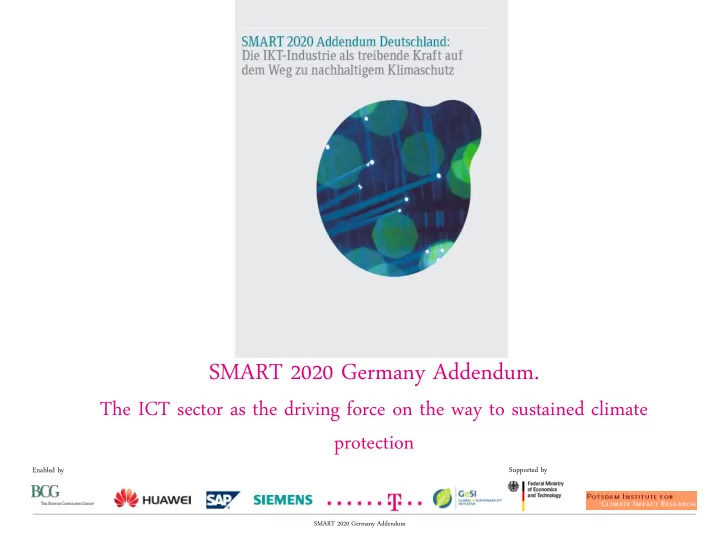

SMART 2020 Germany Addendum. The ICT sector as the driving force on the way to sustained climate protection Enabled by Supported by SMART 2020 Germany Addendum
Situation. Climate change is happening faster than was predicted just a few years ago. Climate change is a threat to business and society. Information and communication technology (ICT) can make a significant contribution to reducing CO2 emissions in nearly all industries. Enabled by Supported by SMART 2020 Germany Addendum
Germany's responsibility as a leading industrialized and technologized nation. In August 2007, at a closed meeting, the German federal government of the time adopted the "Integrated Energy and Climate Program" (IEKP), also known as the Meseberg Program. Target: To reduce CO 2 emissions by 40 % by 2020.* * Compared to the reference year 1990 Enabled by Supported by SMART 2020 Germany Addendum
The ICT industry‘s value proposition. Presentation of the global SMART 2020 study in June 2008. The Climate Group – which is an NGO – presented the study "SMART 2020: Enabling the low carbon economy in the information age" that was produced on behalf of the Global eSustainability Initiative (GeSI). The study investigated the potential contributions that the ICT industry could make to achieving global climate protection goals. The study identified five core areas in which ICT can bring about significant Study concept reductions in emissions: S – Standardization Smart motors Smart logistics Dematerializ-ation Smart buildings Smart grid M – Monitoring (Industrial (Logistics) (Building (Electricity sector) automation) management) A – Accountability R – Rethinking Deutsche Telekom announced a German SMART report at the Third National IT Summit at the end of 2008. T – Transformation Enabled by Supported by SMART 2020 Germany Addendum
SMART 2020 Germany Addendum. Study design and core results. The study shows that the ICT industry can potentially make a considerable contribution towards achieving the national climate goals based on the Meseberg Program: In the year 2020 National reduction target 97 Mt CO 2 e requirement (IEKP total) Reduction potential 207 Mt CO 2 e (ICT total) Reduction potential 13 Mt CO 2 e (ICT direct) Reduction potential 194 Mt CO 2 e (ICT indirect) Enabled by Supported by SMART 2020 Germany Addendum
SMART 2020 Germany Addendum. Considerable contribution by the ICT industry as an enabler. This results in business concepts that are assessable for each of the five sectors that were identified (assessment according to CO 2 reduction potential and economic attractiveness). (e.g., intelligent traffic management, extensive introduction of urban Smart logistics 85.4 Mt CO 2 e congestion charges) Smart buildings 41.7 Mt CO 2 e (e.g., climate control systems in buildings) 26.4 Mt CO 2 e (e.g., optimization of business processes, variable frequency drives in Smart motors industry) Smart grid 23.4 Mt CO 2 e (e.g., load and capacity management for electricity suppliers) 16.3 Mt CO 2 e (e.g., downloading music and videos Dematerialization instead of CD production, virtual conferences) Conclusion: The smart use of ICT solutions could reduce CO 2 emissions in Germany by up to 25 percent by the year 2020 – this is equivalent to 207 metric megatons (Mt). The business value of these concepts is estimated at up to EUR 84 billion by the year 2020. Enabled by Supported by SMART 2020 Germany Addendum
Gap between theory and practice – challenge: basic conditions. The identified indirect reduction potential of ICT, at 194 Mt CO 2 e by 2020, is a theoretical maximum potential. The realistic potential of purely market-driven implementation of the business concepts that were analyzed amounts to 64 Mt CO 2 e by 2020: Gap of 130 Mt CO 2 e (approximately 5.5 times the annual emissions of the German ICT industry*) The study describes four barriers (social, economic, legal, and technical) to the analyzed business concepts that apply to varying degrees for each of the five SMART sectors. Examples: information gaps, lack of technical standards, data protection concerns, change in attitude among the population. At the same time, politicians and the private sector together can pursue four paths to achieve the IEKP climate protection goals: Information campaigns to educate Public financial support for Special levies/taxes as a Legal requirements to enforce the population about individual environmentally conscious attractive business concepts.** motivation for implementing the contributions. business concepts. behavior. * Reference year: 2007 ** Greater attractiveness for end customers, e.g., as a result of uniform technical standards or advance financing models Enabled by Supported by SMART 2020 Germany Addendum
Thank you. Enabled by Supported by SMART 2020 Germany Addendum
Recommend
More recommend